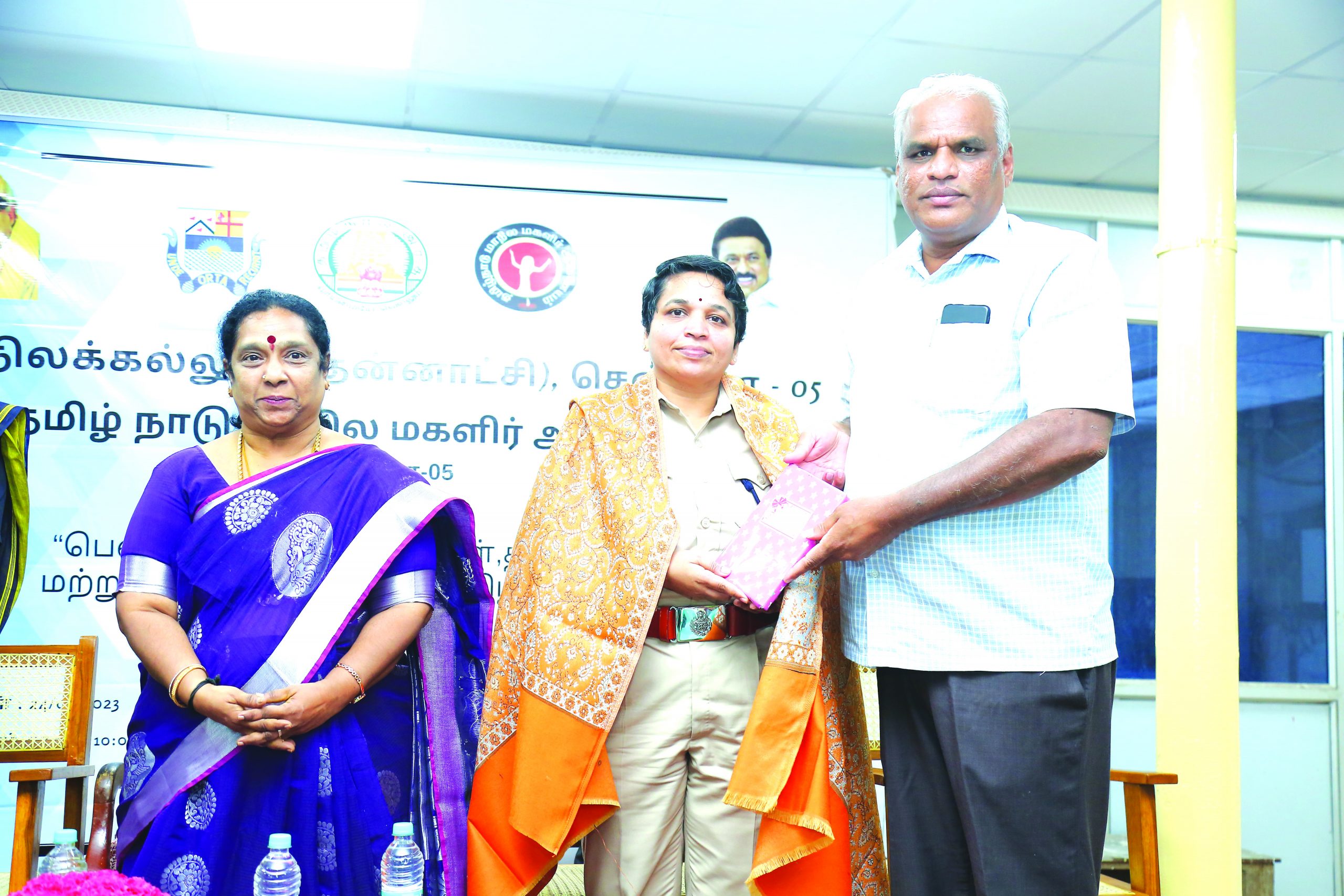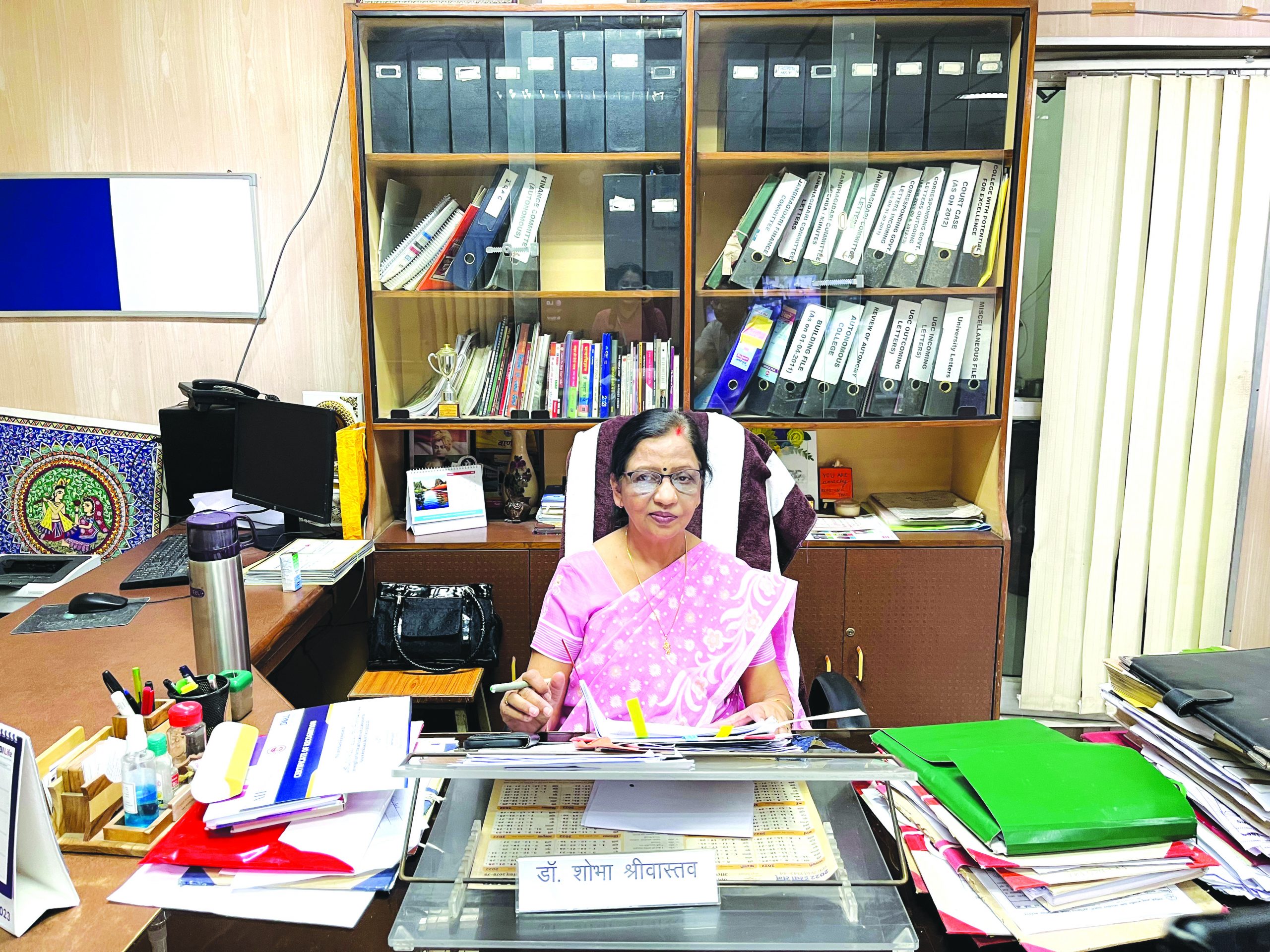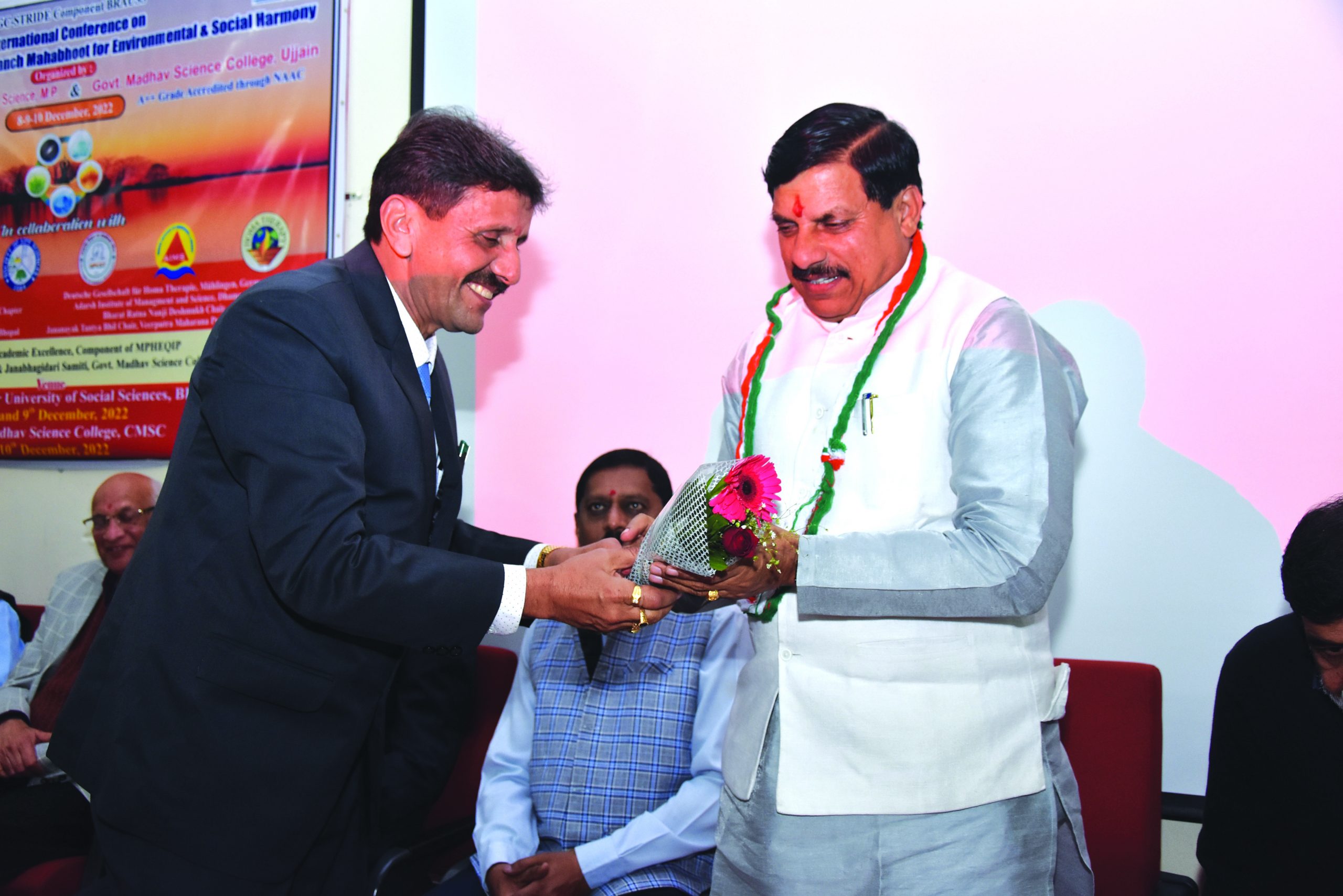The small minority of 188 government colleges who have qualified for autonomous status have a special place of honour within the national higher education system

GDWC, Hyderabad’s Dr. Padmavathi: leapfrog to India #2
According to the latest All India Survey of Higher Education (AISHE) 2020-21 released by the Union education ministry on January 29, India hosts 43,796 colleges providing mainly undergraduate education.
[userpro_private restrict_to_roles=administrator]
Of them, 34,424 (78.6 percent) are privately promoted and 9,372 (21.4 percent) promoted and managed by government. Furthermore, of the 43,796 colleges countrywide, a mere 894 (as on August 28, 2022) have been conferred autonomous status by the Delhi-based University Grants Commission (UGC). The remaining 42,902 are non-autonomous colleges tied to the apron strings of their affiliating universities.
The new National Education Policy (NEP) 2020 has mandated upgradation of all 43,796 undergraduate colleges into multi-disciplinary degree-awarding autonomous higher education institutions and gradual phasing out of the current university affiliation system by 2035. But that’s likely to be a long-drawn-out process given that UGC has set stringent criteria for conferment of autonomous status.
According to UGC rules to qualify for autonomous status, all applicant colleges — government and private — must be of more than ten years vintage and “accredited by either NAAC (National Assessment and Accreditation Council) with minimum ‘A’ Grade or by NBA (National Board of Accreditation of the All India Council for Technical Education) for at least three programmes, or be awarded autonomy by a corresponding accreditation grade/score from a UGC empanelled accreditation agency”.
After conferment of autonomous status, colleges are permitted to review existing courses/programmes and restructure, redesign and prescribe their own courses/programmes of study and syllabi; introduce new courses/programmes; evolve independent performance evaluation systems, conduct examinations and notify results. They are also allowed to issue mark sheets, migration and other certificates. Although their degrees are awarded by the affiliating state university, the name of the college is permitted to be inscribed on the degree certificate.
Of the 894 colleges conferred autonomous status by UGC, the majority — 706 — are privately promoted, and include high-profile institutions such as St. Xavier’s College, Mumbai and Kolkata, St. Joseph’s and Mount Carmel, Bengaluru, Narsee Monjee and Mithibai colleges, Mumbai and Loyola College, Chennai among others. However, several low-profile (state) government colleges have also met the stringent qualifying tests set by UGC and have been conferred autonomous status.
Therefore, the small minority of 188 government colleges who have qualified for autonomous status have a special place of honour within the national higher education system.
Though there’s a wide perceived quality gap between private and government autonomous colleges — evident in the total scores awarded by this year’s sample respondents to top-ranked colleges in the two categories (see p.44 and 66) — the latter serve an important social purpose by providing free-of-charge and/or highly subsidised quality tertiary education to students from underprivileged households. They need to be celebrated and encouraged to continuously improve and upgrade themselves.
Therefore since 2020, when the broad category of Arts, Science and Commerce (ASC) colleges was divided, private autonomous, government autonomous (as classified by UGC) and non-autonomous colleges are ranked separately inter se in the annual EWIHER.
To compile the 2023-24 EW league tables of India’s best private and government autonomous (as well as Top 100 non-autonomous) colleges, field representatives of the well-known Delhi-based Centre for Forecasting & Research Pvt. Ltd (C fore) interviewed 4,088 sample respondents comprising 1,747 college/university faculty and 2,341 final year college students, and persuaded them to rate sufficiently well-known colleges on five parameters of tertiary education excellence, viz, competence of faculty, faculty welfare and development, curriculum and pedagogy (digital readiness), industry placement record, infrastructure and quality of leadership/ governance. Low-profile institutions rated by less than 25 respondents are not ranked.
In this year’s league table of the country’s top-ranked government autonomous colleges, there’s been a major rejig. Maharaja’s College, Ernakulam, ranked #2 for the past two years (2021-22 and 2022-23) and #1 in 2020-21, has reclaimed its position as India’s #1 government autonomous college. Government Degree College for Women, Begumpet, Hyderabad has been catapulted to #2 (#5 in 2022-23) followed by Presidency College, Chennai, which is promoted to #3 (#4). Ranked #1 for two years consecutively (2021-22 and 2022-23), Government Science College, Nrupathunga Road, Bengaluru has slipped to #4 this year. The Top 5 is completed by Yuvaraja’s College, Mysuru which has also lost rank (#3).
It’s pertinent to note that the Top 5 government autonomous colleges are sited in peninsular India, the country’s more educationally advanced half whose citizenry accord high value to education.
However, several emails and phone calls to Dr. V. Joy, principal of Maharaja’s College, Ernakulam (estb.1875), for his reaction to the 148-year-old college being adjudged India’s #1 government autonomous institution remained unanswered.
In sharp contrast, Dr. K. Padmavathi, principal of Government Degree College for Women, Begumpet, Hyderabad (GDCW) was more forthcoming and enthused with the news that GDCW has leapfrogged to India #2 in this year’s rankings.
“We are honoured to learn about our promotion to India #2. It will inspire and motivate our students and faculty to aim for top rank next year. I am also pleased to learn that our highest scores are under the parameters of curriculum and pedagogy and faculty competence. The USP of our 65 study programmes is that all of them comprise at least one skills/employment linked course to boost student employability. Our faculty is also highly qualified — 50 of our 89 teachers have Ph Ds and have published over 300 papers in peer-reviewed journals. Yet, an initiative which distinguishes us from all colleges is that since the last six months, GDCW is providing a free mid-day meal in collaboration with Akshaya Patra to 400 students. Moreover, it is one of few colleges to raise CSR funding to build 100 toilets on campus which were inaugurated three months ago. I believe all these pioneer initiatives are behind our promotion in the comprehensive EW rankings,” says Dr. Padmavathi, an alumna of Osmania University who has served as head of several government colleges in the state since 1995, and was appointed principal of GDCW in 2021. Currently, GDCW has 3,800 women students mentored by 89 faculty on its muster rolls.

Presidency, Chennai’s Dr. Raman (right): “extra colour to already shining crown”
Likewise the promotion of Presidency College, Chennai (PCC) to India’s Top 3 has enthused principal Dr. R. Raman. One of two Presidency Colleges established by the British way back in 1840 (the other is Presidency College, Kolkata, now a state university), PCC has been awarded top scores on the parameters of faculty competence, infrastructure, and leadership/governance quality.
“Rome wasn’t built in a day. It’s the same with Presidency College. I am the 52nd principal of this prestigious institution which was started in 1840. The college has produced two Nobel laureates for physics — C.V. Raman and Subrahmanyan Chandrasekhar — three Bharat Ratnas, five chief ministers including the incumbent M.K. Stalin and many more high achievers in all walks of life. In the latest NIRF Rankings as well, Presidency is ranked #3 all India. So, the EW ranking only adds extra colour to an already shining crown,” says Raman.
According to Raman, over the past two years, PCC which hosts 21 undergraduate and postgraduate departments, has received special attention of the DMK state government to augment its infrastructure. “The infrastructure facilities of our college have received a huge boost thanks to chief minister M.K. Stalin. A sum of Rs.63 crore has been sanctioned to build a 2,000-seater auditorium, and Rs.76 crore for a new students’ canteen. Moreover, two separate hostels for differently abled male and female students, a new examination hall and four new classrooms have been built,” adds Raman who claims that the college is one of the most sought after in south India, having received 95,000 admission applications for 1,106 undergrad seats in the academic year 2022-23.
Beyond the Top 5, there’s a minor readjustment in this year’s league table of India’s best government autonomous colleges. Maharani’s Science College for Women, Mysuru is ranked #6 followed by Sarojini Naidu Government Girls PG College, Bhopal at #7, and Government Holkar (Model Autonomous) Science College, Indore at #8, which have all retained their last year’s rankings. The Top 10 league table of the country’s best government autonomous colleges is completed by Govt. VYT PG Autonomous College, Durg (Chhattisgarh) at #9 (#10) and Kanchi Mamunivar Centre for Postgraduate Studies, Puducherry at #10 (#11) — both of whom have ceded ground this year.

Dr. Shobha Shrivastav: deemed university expectation
“I am proud and elated that Sarojini Naidu Girls PG College is ranked among India’s Top 10 government autonomous colleges and #1 in Madhya Pradesh. I especially credit our 7,000 students for this high rank — they are flexible, adaptive and embrace all changes and new initiatives. I am also happy to learn that our highest scores are under the faculty competence parameter. We have a highly-qualified and talented faculty — our botany professor Dr. Sanjay Sahay has two patents to his credit and Dr. Sudha Dixit was recently designated ‘Innovative music professor’ by the state government. We have also signed up with the e-Granthalaya project of the National Informatics Centre. Under this e-library project, 65,000 books will be digitised by end April,” says Dr. Shobha Shrivastav, principal of Sarojini Naidu Government Girls PG College, Bhopal, who adds that “talks are on” with the state government to transform the college into a deemed university.
Further down the 83-strong league table of India’s top-ranked government ASC autonomous colleges, several institutions have risen in esteem of the informed public. Among them: Government Madhav Science College, Ujjain to #11 (#14 in 2022-23), Kohima Science College, Jotsoma to #14 (#18), Fakir Mohan Autonomous College, Azimabad to #22 (#36) and Government Digvijay PG Autonomous College, Rajnandgaon to #34 (#40).

Prof. VK Gupta (left): institution of national importance target
“It’s great news that Government Madhav Science College has moved up in the EW rankings. The credit goes to our hard-working faculty and their untiring efforts to ensure holistic development of students. More than 95 percent of our faculty has Ph D degrees and are continuously updating themselves through participation in workshops and seminars. Therefore, I am not surprised our highest score is on the parameter of faculty competence. Our objective is to work towards being designated an Institution of National Importance,” says Prof. V.K. Gupta, principal of Government Madhav Science College, Ujjain (estb.1969) which has 3,316 students and 79 faculty.
It’s pertinent to note that only 13 of the country’s 29 states are represented in this year’s rankings of government autonomous colleges. Surprisingly, the populous states of West Bengal, Maharashtra, Gujarat, Bihar, and Uttar Pradesh don’t have a single government autonomous college sufficiently well-qualified for inclusion in the EW 2023-24 league of India’s best government autonomous colleges.












Add comment